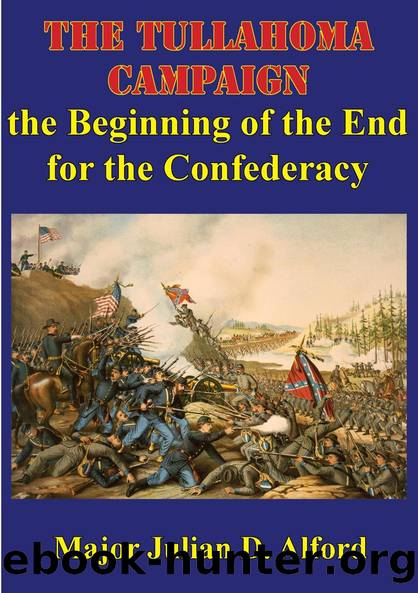The Tullahoma Campaign, The Beginning Of The End For The Confederacy by Major Julian D. Alford

Author:Major Julian D. Alford [Alford, Major Julian D.]
Language: eng
Format: epub
Tags: History, United States, Civil War Period (1850-1877), Military, Modern, 19th Century
ISBN: 9781782897552
Google: XB5vCwAAQBAJ
Publisher: Pickle Partners Publishing
Published: 2014-08-15T05:01:45+00:00
The Beginning of the End
The true strategic importance of the Tullahoma position, and for that matter, Middle Tennessee as a whole, never seemed to register with Braggâs superiors in Richmond. Bragg understood the importance of his position, not only for his army but also for the entire Confederacy. He had written his wife, Elise, on July 5, "This is our darkest hour". On July 4, as Bragg retreated across the Tennessee River, Lee pulled his defeated Army of Northern Virginia out of Gettysburg, Pennsylvania and Pemberton surrendered his entire army to Grant at Vicksburg, Mississippi.{45}
Richmondâs full attention had been focused on the eastern and western armies while almost ignoring Braggâs central army. In late May, one of Braggâs divisions had been sent to Mississippi to support Pemberton and on June 25, two days after the Tullahoma Campaign opened, President Davis asked Bragg to reinforce further the armies in Mississippi. Richmond was so out of touch with the condition and plight of their central army that on July 4 the office of the adjutant general had issued orders to a captain to report to Braggâs army at Tullahoma. Braggâs army, however, had left Tullahoma four days earlier. Since the telegraph allowed for same-day correspondence between headquarters, it is almost inconceivable that Richmond could have so lost contact with one of its three major armies.{46}
General Rosecransâ offensive maneuver victory in Middle Tennessee was far superior both tactically and operationally to Major General George Meadeâs defensive victory at Gettysburg. Although Meadeâs win boosted morale, especially for the Army of the Potomac, defensive victories would never win the war. Lee escaped from Gettysburg with most of his army and went on to win defensive victories almost every week during 1864 and still ended up surrendering at Appomattox. Grantâs victory at Vicksburg was a huge symbolic victory for the north because of the prestige of the Mississippi River, but winning it had little actual strategic importance because the Confederates had so little commerce west of the river, therefore the south lost virtually nothing.
At the beginning of the war, the Federals stated three major objectives that they needed to accomplish in order to be victorious. First, take Richmond and kill the secessionist spirit by conquering the Rebel capital. This had been attempted repeatedly but never accomplished up to this point. Second, control the Mississippi Valley and secure the western waterways. Grant had accomplished this objective by capturing Vicksburg. Finally, seize east Tennessee and hold the Nashville-Atlanta corridor, which was seen by the Federals as the major artery in the southern lifeline. Rosecransâ Army of the Cumberland had achieved most of this objective in the Tullahoma Campaign and Major General William T. Sherman would finish the objective the following summer. Winning the Tullahoma Campaign and capturing Middle Tennessee was the start of obtaining one of the stated objectives.
Even as Rosecrans was completing his great maneuver campaign at Tullahoma, it seemed to make no impression on Washington. On July 7, Stanton telegraphed Rosecrans the news of the Union victories at Gettysburg and Vicksburg.
Download
This site does not store any files on its server. We only index and link to content provided by other sites. Please contact the content providers to delete copyright contents if any and email us, we'll remove relevant links or contents immediately.
| United States | Abolition |
| Campaigns & Battlefields | Confederacy |
| Naval Operations | Regimental Histories |
| Women |
In Cold Blood by Truman Capote(2702)
Steve Jobs by Walter Isaacson(2459)
All the President's Men by Carl Bernstein & Bob Woodward(1972)
Lonely Planet New York City by Lonely Planet(1857)
The Murder of Marilyn Monroe by Jay Margolis(1752)
The Room Where It Happened by John Bolton;(1729)
The Poisoner's Handbook by Deborah Blum(1671)
And the Band Played On by Randy Shilts(1632)
Lincoln by David Herbert Donald(1622)
The Innovators by Walter Isaacson(1612)
A Colony in a Nation by Chris Hayes(1530)
The Innovators: How a Group of Hackers, Geniuses, and Geeks Created the Digital Revolution by Walter Isaacson(1519)
Under the Banner of Heaven: A Story of Violent Faith by Jon Krakauer(1425)
The Unsettlers by Mark Sundeen(1347)
Amelia Earhart by Doris L. Rich(1346)
Birdmen by Lawrence Goldstone(1346)
Decision Points by George W. Bush(1261)
Dirt by Bill Buford(1247)
Zeitoun by Dave Eggers(1231)
